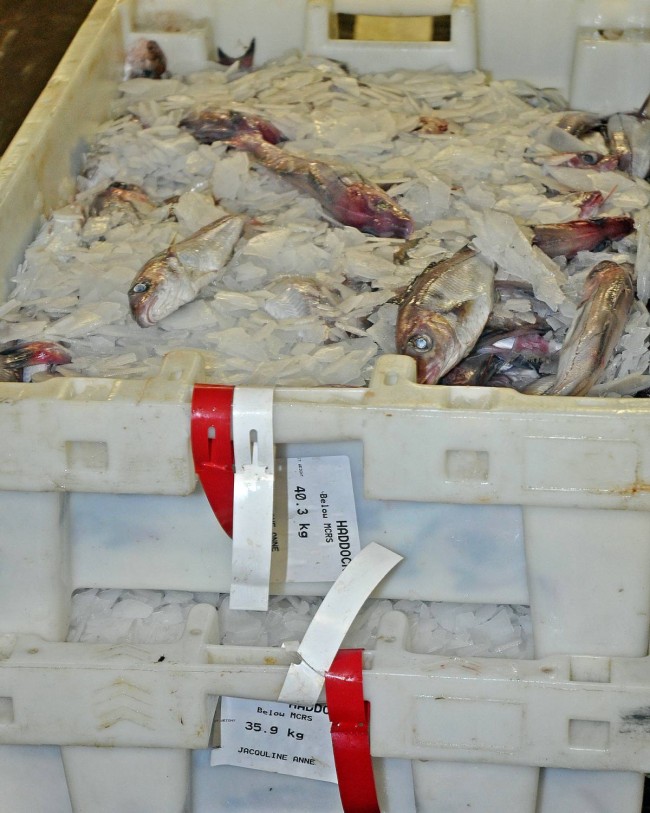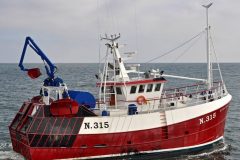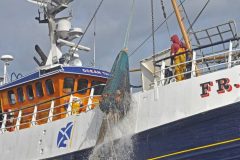History was made at Fraserburgh two weeks ago when the first whitefish discards under the first phase of the demersal landing obligation, which came into force on January 1, were smoothly put ashore separately, reports David Linkie.
Above: Skipper Adam Tait empties a box of haddock discards into a larger bin on Fraserburgh fishmarket, which has ABP3 approval for the landing, storing and removal of demersal discards.
Three days after the landing obligation was implemented, 387kg of discards, mainly haddock with smaller qualities of plaice, were recorded separately as three boats, Artemis WY 809, Rebecca FR 143 and Mia Jane W FR 443, landed 248 boxes to the first market of the year at Fraserburgh.
The following morning, a further 124kg of haddock discards came when Daystar BF 151 and Jacqueline Anne FR 243 landed 437 boxes of mixed fish. Due to severe weather conditions, Jacqueline Anne skipper Jonny Tait consigned his fish to Fraserburgh after landing in Macduff.
In line with the landing obligation requirement, the haddock and plaice discards were boxed separately, before being weighed, labelled and iced to the same standard as the vessels’ marketable catches.
On landing, when it is a skipper’s responsibility to record the amount of discards on new triplicated forms, any boxes of demersal discards are immediately tipped into larger bins to await collection by United Fish Industries (UK) Ltd for transport by road to Aberdeen.
Fraserburgh is the first port in the UK to achieve Animal By-Products 3 (ABP3) approval for the landing, storing and subsequent removal of demersal discards. An essential requirement for this status is the capability for discards to be handled and stored away from all other market fish as soon as it is landed.
Following extensive work by Fraserburgh Harbour Commissioners, approval is now in place for whitefish discards to be either placed in the south section of the north fishmarket, or the middle section of the south market when both markets are in use at times of bigger landings.
Read more from Fishing News here.


History was made at Fraserburgh two weeks ago when the first whitefish discards under the first phase of the demersal landing obligation, which came into force on January 1, were smoothly put ashore separately, reports David Linkie.
Above: Skipper Adam Tait empties a box of haddock discards into a larger bin on Fraserburgh fishmarket, which has ABP3 approval for the landing, storing and removal of demersal discards.
Three days after the landing obligation was implemented, 387kg of discards, mainly haddock with smaller qualities of plaice, were recorded separately as three boats, Artemis WY 809, Rebecca FR 143 and Mia Jane W FR 443, landed 248 boxes to the first market of the year at Fraserburgh.
The following morning, a further 124kg of haddock discards came when Daystar BF 151 and Jacqueline Anne FR 243 landed 437 boxes of mixed fish. Due to severe weather conditions, Jacqueline Anne skipper Jonny Tait consigned his fish to Fraserburgh after landing in Macduff.
In line with the landing obligation requirement, the haddock and plaice discards were boxed separately, before being weighed, labelled and iced to the same standard as the vessels’ marketable catches.
On landing, when it is a skipper’s responsibility to record the amount of discards on new triplicated forms, any boxes of demersal discards are immediately tipped into larger bins to await collection by United Fish Industries (UK) Ltd for transport by road to Aberdeen.
Fraserburgh is the first port in the UK to achieve Animal By-Products 3 (ABP3) approval for the landing, storing and subsequent removal of demersal discards. An essential requirement for this status is the capability for discards to be handled and stored away from all other market fish as soon as it is landed.
Following extensive work by Fraserburgh Harbour Commissioners, approval is now in place for whitefish discards to be either placed in the south section of the north fishmarket, or the middle section of the south market when both markets are in use at times of bigger landings.
Read more from Fishing News here.




